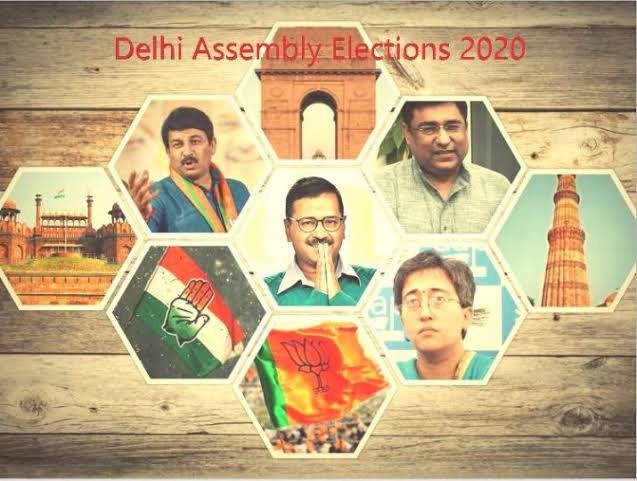
At the point when Delhi Boss Pastor, Arvind Kejriwal, talked at the Hindustan Times Authority Summit a month ago, he discussed his administration's accomplishments. The Bharatiya Janata Gathering (BJP), he asserted, may battle races on the issue of character in different spots, however, in Delhi, it needed to rival the Aam Aadmi Party (AAP) on issues of advancement.
A month is quite a while in governmental issues. Also, if the advancements in Delhi are a sign, Kejriwal may have evaluated his own investigation of the idea of the up and coming get together political decision.
Above all, for what reason is the Delhi political decision noteworthy? The city sends just seven individuals to the Lok Sabha. The gathering likewise simply has 70 voting public. The administration itself has constrained forces in light of a to some degree novel course of action where the Inside activities control over lawfulness and land.
However, the imagery of Delhi is difficult to miss. By the goodness of it is the capital, it conveys lopsided political weight. By the righteousness of the city being home to what is viewed as the national media, it involves more prominent consideration in the open creative mind. The very idea of Delhi's legislative issues has likewise loaned its specific centrality. It was here that India Against Debasement development changed into the AAP, which at that point went on to initially win 28 seats in 2013, and afterward cleared 2015 get together surveys with 67 of the 70 seats. Delhi hence turned into the image of another test in Indian governmental issues.
It additionally gave India an early look into how voters have started recognizing state and national races. It was here that the Bharatiya Janata Party (BJP) won every one of the seven seats in the 2014 Lok Sabha decisions, just to be decreased to an insignificant three get together seats eight months after the fact in the state surveys. As one of India's pre-prominent urban focuses, which is home to vagrants all things considered, and residents everything being equal, the city likewise is a microcosm of a bigger India.
The 2020 political race will along these lines give a feeling of numerous patterns in Indian legislative issues. Was the AAP an abnormality or can a generally new power standardize itself as a foundation party? Will national gatherings make a rebound? Will voters again make a qualification among state and national surveys? Are voters practicing their decision dependent on their provincial and standing roots or is there a progressively common language of legislative issues that they partner with? What's more, what will be the effect of the as of late passed Citizenship (Amendment) Act (CAA) and the resulting fights on India's discretionary scene?
To comprehend the smoothness of the political scene in Delhi, simply return eight months.
The BJP prevailed upon half of the vote share in Lok Sabha surveys in 2019, easily sacking each of the seven seats. Regardless of much publicity, noticeable AAP applicants lost, with the gathering coming third in five of the seven seats. The buzz was this would get imitated in the gathering surveys, for even a unified AAP-Congress alliance would not have the option to overcome the BJP.
Be that as it may, inside months, the account changed. Kejriwal chose to receive another methodology. He mitigated his analysis of Narendra Modi for he didn't need the Delhi surveys to be a Kejriwal versus Modi challenge. He avoided national issues. On subjects which he thought could estrange Hindu voters — from Kashmir to Ayodhya — he chose to be strong of the administration. What's more, rather, he made the political race as nearby as conceivably, concentrating just on two inquiries — neighborhood initiative in Delhi and the neighborhood administration record of the AAP.
The administration network was basic. The AAP had Kejriwal; who did the BJP have? Is it safe to say that it was Manoj Tiwari, the state unit president, or would it say it was Vijay Goel, a veteran city pioneer harboring aspirations, or would it say it was Harshvardhan, the wellbeing priest with establishes in Delhi legislative issues? The BJP didn't have a reasonable answer.
On administration, the AAP pitched it’s as a matter of fact great work in training through the patch up of government schools and in general wellbeing through mohalla centers. It likewise referred to the free and continuous inventory of power, free or sponsored water, and free open vehicle for ladies.
This, at that point, was the alleged blend intended to guarantee Kejriwal's re-appointment.
Be that as it may, over the previous month, two advancements have occurred. The first is the CAA and fights against it in Delhi's colleges and Muslim-ruled territories — from Shaheen Bagh and Seelampur to Jama Masjid and Daryaganj. The discretionary effect of this isn't clear. While the BJP may have distanced a segment of the understudy vote, just as perhaps an area of the white-collar class upset by the biased idea of the law, party strategists accept that the enactment and reaction against it might really support them.
It can possibly captivate the electorate and make it an "H-M", or a Hindu-Muslim political race. The BJP ascertains that a staggering number of quiet Hindus bolster the law — and are angry with the fights. While the AAP has scrutinized the CAA and the administration crackdown on colleges like Jamia, it knows about this potential polarization — and has additionally looked to keep a good way from the fights.
The subsequent improvement is the Inside's choice to give possession papers to inhabitants of unapproved states, which it cases will profit 4,000,000 families. While the BJP has said that it has satisfied the since quite a while ago held desire that such settlements will be regularized, the AAP points out that regularization has not occurred — and it is the regional government, truth be told, which gave access to different offices, from power to water supply, legitimately to these provinces and inhabitants. Yet, in the skirmish of recognitions on the issue, the BJP seems to have the edge.
There is one other variable in the political decision — the Congress. While there is an agreement that the Congress will come third, the inquiry is the vote share it directions. On the off chance that the Congress can hold an enormous portion of the Muslim vote in the city, and get over 15% of the vote, the AAP will be stressed, for it will mean a straight division of against BJP votes. In any case, if Muslims choose to as a group vote in favor of the AAP, and the Congress' vote share stays in lower single digits, it turns into a straight go head to head between the AAP and the BJP, which may well suit the previous.
It is this on a very basic level bipolar yet potentially triangular fight, through the trap of nearby and national issues, is a challenge which will expect the shapes of a Kejriwal versus Modi outline, that Delhi's voters will practice their decision one month from now. The outcomes will have national criticalness.

